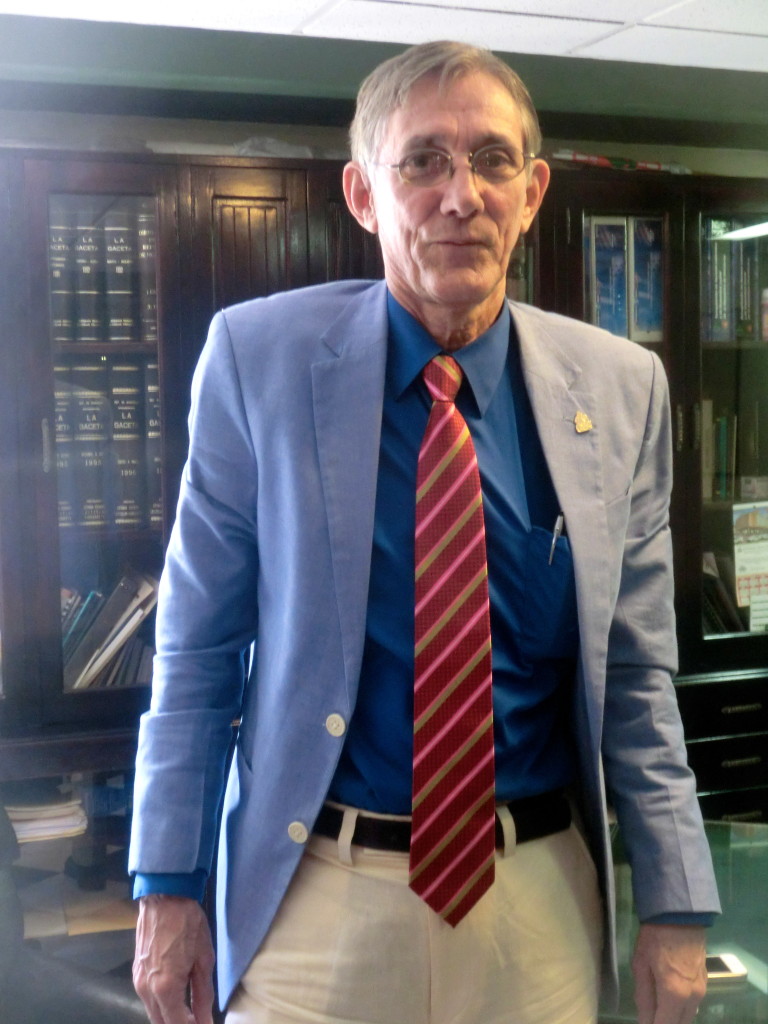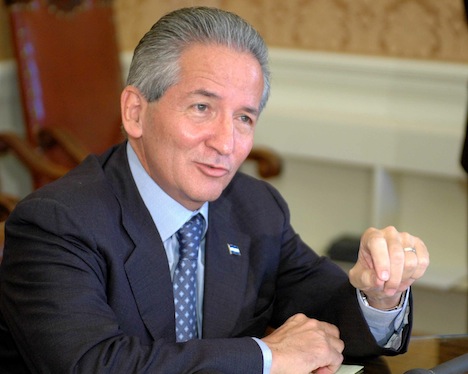TEGUCIGALPA — Germán Leitzelar seems particularly spry for 68 years. In the course of an hour’s discussion in his law offices on the top floor of the Miraflores mall in central Tegucigalpa, he’ll bound up to grab a well-worn copy of the Honduran constitution to make a point, and then point out one article after another with the tenacity of an attorney half his age.![]()
Leitzelar (pictured above) is at once both inside and outside Honduras’s political elite.
A congressman for the Partido Innovación y Unidad (PINU, Innovation and Unity Party), Leitzelar represents a small party that’s never held more than five seats in the unicameral, 128-member Congreso Nacional (National Congress). PINU was founded in 1970, after the destabilizing ‘Fútbol’ War with El Salvador in 1969, as an alternative to the two main political parties at the time — the conservative Partido Nacional (National Party) and the more centrist Partido Liberal (PL, Liberal Party).
‘We have always been a party that been focused on thoughts and processes, and it hasn’t always been a party that appeals to the mass majority, but working for the mass majority, with democracy always in mind, constituting an equilibrium, a balance in Congress,’ he said.
Leitzelar opposed the June 2009 coup that ousted Manuel Zelaya from power (though he’s certainly no fan Zelaya’s), and he’s been a strident critic of the president of the National Congress, Juan Orlando Hernández, the National Party’s presidential candidate. In particular, Leitzelar spoke out against a 2012 vote by the National Congress to depose four justices of the Honduran supreme court, which he believed was unconstitutional.
But lest you believe Leitzelar is simply a good-government ninny tossing pebbles into a political system where PINU barely causes a ripple, he’s also been at the heart of Honduran power — as minister of labor in the previous National Party administration of Ricardo Maduro (pictured below) between 2002 and 2006. Above the sofa in Leitzelar’s office is a large framed drawing of the entire cabinet in caricature, and Leitzelar believes that it represents as good a government as Honduras has ever had.
Many Hondurans view Maduro’s administration as somewhat of a success, at least insofar as that it didn’t result in a military coup (like the Zelaya administration) or preside over the deterioration of Honduran security and the Honduran economy (like the current administration of Porfirio Lobo Sosa). It’s a view that Leitzelar shares, and he has as much disapproval for the first Zelaya administration as the current administration.
‘Maduro’s presidency was a process of conciliation with regard to the country’s economy, debt reduction, and ultimately pursued a strategy of poverty reduction from the proceeds of the debt reduction,’ he said. ‘It was a completely technical government with influence from the World Bank. I was not a member of National Party, but the government that followed Maduro introduced new rules, and that’s when the crisis began, because they destroyed what Maduro had done. They used the funds for another vision, and the result was the political crisis of 2009, or the coup over constitutional change, or a constitutional crisis. The name doesn’t matter — the color of the cat doesn’t matter, as they say, but whether it chases mice.’
‘The issue is that the new government modified everything, and all the funds from the debt reduction were spent in another way. There was a high level of corruption and impunity in Zelaya’s government, and it was even worse in the six months of [interim president] Roberto Micheletti. Not only did they accrue debt, but they also abused the national funds. In [Lobo Sosa’s] government, with all of its defects, it has one virtue – even though it wasn’t able to grasp the financial situation, it did stabilize the crisis, it avoided further unconstitutional confrontations and it reintroduced Honduras into the international arena. However, it has failed in a bunch of other areas, such as drugs, impunity and corruption.’
By extension, he has low expectations for either a Hernández presidency or the presidency of Zelaya’s wife, Xiomara Castro de Zelaya, who leads the leftist, newly founded Partido Libertad y Refundación (LIBRE, Party of Liberty and Refoundation), a party that Leitzelar sniffingly refers to as Liberales en resistencia (‘Liberals in resistance’).
Leitzelar argued that, for all the rhetoric on the campaign trail, there’s not a real ideological conflict in Honduras. The only ones with real ideology are LIBRE’s earnest socialist activists, but they’re ultimately powerless because LIBRE is controlled by the same elites that controlled the Liberal Party in the mid-2000s. While Leitzelar maintains that the coup was illegal, he disagrees that Zelaya was blameless.
‘[The three leading parties] are not parties with ideological differences, they are parties each with a vision of gaining power,’ he said. ‘That’s their vision. They are not leaders, they just want to continue in power. They don’t want a different vision for the country, they are caudillos.’
Furthermore, Leitzelar accused party leaders of building personality cults designed to massage their own egos, and he singled out Zelaya in particular.
‘They’ll go to a funeral and they want to be the corpse,’ he said. ‘They want for everyone to see them.’
It’s not a particularly optimistic vision for Honduras’s future, at least in the short term, but Leitzelar outlined a vision for progress based on a strong economy, drawing on his own experience as a minister at the heart of government a decade ago.
‘Strong labor rights depend on a strong economy,’ he said. ‘If there’s not a strong economy, the rights and the laws become limited and constrictive, and they exist only for those who already have a job. If there’s no growth, there are no general benefits. So we believe that we need investment to generate decent jobs and for that, you need three things: infrastructure on behalf of the state — communications, roads, ports and electric energy at a decent rate so you can have all of those; national and international investment; and the capacity for training new technology. In addition to that, we also need judicial security. That doesn’t just mean good laws, it means applicable laws.’
Top photo credit to Kevin Lees; bottom photo credit to OAS.

